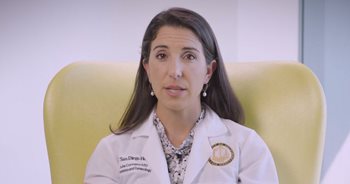31 July 2019
Expecting Parents Get Help Asking Better Questions
Dr. Julia Cormano, obstetrician/gynecologist and Assistant Professor of Obstetrics, Gynecology, and Reproductive Sciences, practices at Hillcrest UC San Diego Medical Center and hosts a web series on UCTV’s Motherhood Channel that offers short topics on pregnancy from what is happening during routine tests to post-partum depression.

She said that the team at UC San Diego Health decided to keep the videos short because expecting parents don’t usually have a lot of time, but they will have a lot of questions.
“While a 5-minute video can never go in-depth enough,” she said. “Hopefully it helps expecting parents have some background information to help shape the questions they’d like to bring to their own provider.”
Cormano took some time to talk about why she took on this project and what insights she has as a doctor and mother of a small child who is currently pregnant with her second child.
Expecting parents share a lot of information with each other online, what do you tell your patients about seeking information in forums or blogs that aren’t moderated by a team of doctors?
I encourage my patients either to avoid them completely, or to make sure to keep their perspective when reading these kinds of sources. While it can be useful for them to think through some of their own questions, I emphasize the importance of talking through concerns with me (or their provider), because often what they’ve read is inaccurate or highlights an unusual situation.
How should expecting parents judge the best information online?
Looking for the source of the information is important! Be suspicious of information from a private company, such as a formula or drug company, since their primary goal at the end of the day is to sell their product. I encourage you to visit reliable, non-biased sites such as the American College of Obstetrics and Gynecology, the CDC, and of course, UC San Diego’s Health Motherhood TV.
What topics do you hope to address after your maternity leave that you haven’t already covered in the series?
We are lining up some really important and exciting topics, including videos on breast-feeding and lactation, pelvic floor health post-partum, vaccines and pregnancy, and delivery location options to name a few.
Has being pregnant (now for a second time) given you any unexpected insights?
It’s one thing to say to patients, “Each pregnancy feels different.” It’s another thing to experience it! Let me just reiterate it here: Each pregnancy is its own adventure, and your body may feel very differently between each one.
 What did you look for in deciding which doctor/provider you trust to deliver your baby?
What did you look for in deciding which doctor/provider you trust to deliver your baby?
Most importantly, clear medical qualifications (knowing where he/she attended medical school and residency) and board certification in his/her specialty (whether it’s family medicine with OB experience or an Obstetrician & Gynecologist). If your choice is a midwife, I recommend making sure she is a Certified Nurse Midwife (CNM). Beyond that, a provider who listens well and who offers options, whenever it is safe, in regards to decision-making during pregnancy.
What’s the best advice you’ve ever heard or given to expecting parents?
Enjoy this time as much as possible! The miracle of pregnancy is a unique time in life. No matter how uncomfortable you feel or how much unknown you’re facing, pregnancy is an incredible experience that you deserve to cherish and remember life-long.